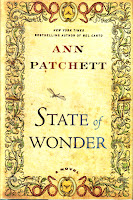Author: Ann Patchett
Pages: 353
Publisher: Harper Collins
ISBN: 978-0-06-204980-3
Although not
explicit, State of Wonder embodies the three different definitions of
wonder, according to Dictionary.com:
1. to think or
speculate curiously
2.to be filled
with admiration, amazement, or awe; marvel
3. to doubt
The Vogel company
has an uncommunicative, isolationist scientist in the Amazon region
of Brazil that is researching a miracle fertility drug that could
extend pregnancy beyond middle age. However, the CEO, Mr. Fox, can't
get a progress report from Dr. Swenson and when Anders Eckman is sent
to get one, he supposedly dies in the jungle. Marina Singh, a former
student of Dr. Swenson, is sent next to attempt to find the
research station and extract some reports on the research.
This book is her
journey, comparable to Conrad's Heart of Darkness, into the darkness
of not only the jungles of Brazil, but the darkness of medical ethics
and exploitation of research subjects. During this journey, Marina is
troubled by her own background - an Indian father who mostly
abandoned his American family, her perception of herself as
unremarkable, and her own medical mistake that forced her to leave
hands-on medicine to lab research. Once in Brazil, she is confronted
with the strange juxtaposition of colonial and uncivilized Manaus and
the hippie gatekeepers of Dr. Swenson's outpost. Dr. Swenson herself
is an indomitable force, who inspires both awe and fear in those who
work for her, including the native tribe, the Lakashi.
Once Marina is
accepted to the outpost, she travels down the river, and much like
Conrad's Marlow, as civilization recedes the darkness of the jungle
encroaches on Marina both physically and emotionally. However, the
greatest darkness is the flagrant disregard for medical ethics as the
means are constantly justified by the ends. The unique substance in
the jungle may hold answers to multiple medical issues and Marina is
quickly subsumed into both the Lakashi and research cultures.
However, she quietly continues to doubt Dr. Swenson's methods and
words. I don't want to reveal the climax, as it is a good one, but
Marina has good reason to distrust her former teacher – who has
been in the jungle too long.
Through most of
the book, Marina moves about in a “state of wonder” - either
drugged, sick, in shock or intimidated by her teacher. However, she
finally makes sense of her own experiences and convictions and begins
to make decisions for herself, rather than acquiesce to the demands
of others.
“I don't like work--no man does--but I like what is in the work--the chance to find yourself. Your own reality--for yourself not for others--what no other man can ever know. They can only see the mere show, and never can tell what it really means.”
― Joseph Conrad, Heart of Darkness
― Joseph Conrad, Heart of Darkness

No comments:
Post a Comment